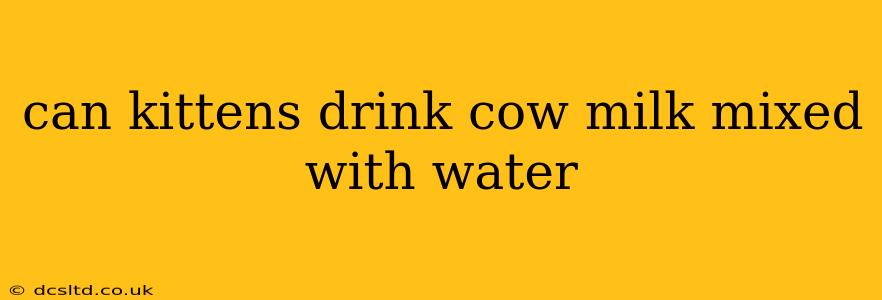Can Kittens Drink Cow Milk Mixed with Water? A Definitive Guide for Cat Owners
The short answer is: no, kittens should not drink cow's milk mixed with water (or cow's milk alone). While the image of a kitten lapping up milk might seem endearing, cow's milk is actually harmful to kittens and can cause serious health problems. This article delves into why this is the case and explores safer alternatives for keeping your little feline friend happy and healthy.
Why is Cow's Milk Bad for Kittens?
Cow's milk is specifically formulated for calves, not kittens. It contains different levels of fats, proteins, and lactose than a kitten's digestive system is equipped to handle. These differences can lead to several issues:
-
Digestive Upset: The high lactose content in cow's milk can cause diarrhea, vomiting, and gas in kittens. Their immature digestive systems struggle to break down the lactose efficiently, leading to discomfort and potential dehydration.
-
Nutritional Imbalance: Cow's milk lacks the essential nutrients that kittens need for proper growth and development. Kitten formula, for example, is specifically designed to provide the right balance of vitamins and minerals vital for a healthy immune system and strong bones.
-
Allergies: Some kittens may be allergic to the proteins in cow's milk, leading to skin problems, respiratory issues, and digestive problems.
-
Long-Term Health Issues: Consistent consumption of cow's milk can lead to more serious long-term health problems such as pancreatitis (inflammation of the pancreas).
What Should Kittens Drink Instead?
The best alternative to cow's milk for kittens is kitten formula. This specially formulated milk provides all the necessary nutrients, vitamins, and minerals for healthy growth. You can find kitten formula at most pet stores.
Other Alternatives (with caveats):
-
Goat's Milk: While goat's milk is often considered a gentler alternative to cow's milk for some mammals, it is still not a replacement for kitten formula. It's lower in lactose than cow's milk but still may cause digestive upset.
-
Water: Water is essential for kittens' hydration and should always be readily available.
What if My Kitten Accidentally Drank Cow's Milk?
If your kitten accidentally ingested a small amount of cow's milk, monitor them closely for any signs of digestive upset, such as diarrhea, vomiting, or lethargy. If you notice any of these symptoms, contact your veterinarian immediately.
How Much Kitten Formula Should I Give My Kitten?
The amount of kitten formula your kitten needs will depend on their age and weight. Follow the instructions on the kitten formula packaging carefully, or consult your veterinarian for guidance. Overfeeding can be just as harmful as underfeeding.
Can I give my kitten adult cat food and milk?
No, adult cat food isn't suitable for kittens. Kittens require a diet that is higher in protein and fat to support their rapid growth. Similarly, as discussed above, avoid giving them any type of milk. Stick to kitten formula or wet kitten food.
Is it safe to mix water with kitten formula?
Diluting kitten formula with water is generally fine, but always follow the instructions on the packaging. Some formulas may already be appropriately diluted.
In conclusion, while the idea of giving a kitten milk might seem natural, it's crucial to understand that cow's milk isn't suitable. Always prioritize kitten formula to ensure your little one thrives. If you have any concerns about your kitten's diet, consult with your veterinarian for personalized advice.
